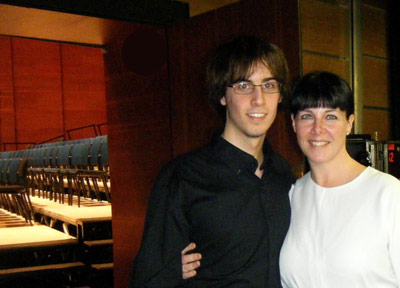basque heritage worldwide

05/14/2013

ADVERTISING
Donostia-San Sebastian. Music lovers on both sides of the Atlantic rejoiced at the election of Julitxu Gysling Zubillaga as the president of the Federation of Choirs of Gipuzkoa, in recognition of her great dedication to the world of choral music. This is also a sign of Diaspora’s contribution to Basque culture, far from just being limited to repeat it from a distance, keeping it alive, and in some cases like Julitxu’s, bringing it back enriched with experiences and cultures from other countries.
She received the nomination with “satisfaction that so many have so much confidence in her” and with the intention of continuing with projects and services that the Federation provides to the 110 member choirs.
Aitona’s Legacy
Julitxu Gysling came to this world thanks to her grandfather, Hipolito Zubillaga from Errenteria, txistulari, musician and choir director who immigrated to Argentina at the age of 21 and was one of the founders of the Necochea Basque club. At the age of five, Julitxu, his granddaughter sang in two of the choirs that he directed, one of which was the club’s children’s choir. “For as long as I can remember, I was at his side. When I was two, he used to take me to choir practices and I sat on a chair next to the piano, even before my feet reached the ground. He was my first director, music professor and colleague,” she says.

[Julitxu, showing her desire to learn how to play the txistu from a very young age in the arms of her proud grandfather, Hipolito Zubillaga (photo JGysling)]
He used to listen to Andra Mari from Errenteria records by the Pizkunde choir in Caracas and he had an LP of Eskifaia Abesbatza from Hondarribia, he loved that choir and taught me to recognize quality in the record,” Julitxu recalls. Years later, settled in Euskal Herria, she was able to meet the director of that choir, Javi Busto, and sing with him for more than 10 years.
The Basque club a second home
The Necochea Basque club was, and still is, very important to the Basque-Argentinean. “My brothers and I grew up there. For many, the club was our second home; the home of a much larger family. I was a dancer, txistulari, I sang in the choir and founded and directed the children’s choir, “Gure Aziak, until I moved to the Basque Country. My family (including three nephews who are dantzari txikis) are still there, working, and participating in what our grandparents started when they arrived: preserving, caring for, and spreading our roots.”

[Julitxu, at the left, with her siblings at the sapling of the Tree of Gernika in Necochea during the 1991 Aberri Eguna celebration (photo JGysling)]
The Euskal Etxea in Necochea is a very active one and Julitxu continues in close contact and sees it “very much in motion. Luckily, leaving this very, very clear, aside from the adversities, and the difficulties presented “DOING” is always possible. They are a strong family, full of desire, tireless, that can’t sit still.
Back to Errenteria
Twenty-one years ago, Julitxu decided to make the leap and make her dream come true, to live in Euskal Herria. “I lived, like many youth, in the Diaspora with my heart on this side of the ocean. My adolescence was spent reading Basque mythology and listening to Imanol, Mikel Laboa, Lertxundi, Lete….After a couple of trips that I took with my grandparents, I got a scholarship in 1992 to study Basque for a couple months in Lazkao, and I stayed: with enormous pride of having done it in Errenteria that my grandfather loved so much.”
During her time in the Basque Country she maintained the strong connection with her grandfather until his death, five years ago. “He lived my every move in choral music happily from a distance, every concert, every trip, every contest, every recording, everything I’ve been producing here musically. I called him every week and shared everything and that made him very happy. Everything that I have today in my life (and that of my children) has to do with music, and I owe it and dedicate it to him,” she confesses.

[Performing with the Landarbaso Abesbatza in China (photo JGysling)]
Learning Basque by singing
Julitxu says that growing up in the Diaspora gave her everything necessary to feel at home in Euskal Herria and that she never felt like a stranger here, among other things, the language. She speaks Basque and those around her are also Basque speakers. “I have heard it and sung it since the time I was born and that clearly helped,” she explained. “It is almost hard for me to speak to my children in erdera, I worked in Ikastolas and curiously passed the Basque exams with very high grades, even the orals, and grammar is difficult for me, what they call the euskaldunzaharra effect.”
In regards to her personal experience, Julitxu sees efforts made to teach Euskera in the Basque clubs as a very good thing. “I am aware of the efforts made for Euskera in the Diaspora, from the youngest and not so young groups of classes in the clubs, as well as projects at the university level,” she affirms. “For those who have no direct contact with it, to the language scholar, to the youth who dream of going to the Basque Country some day and know that today you have to bring Euskera in your suitcase if you want to settle here.”
ADVERTISING
ADVERTISING
ADVERTISING
ADVERTISING
ADVERTISING
© 2014 - 2019 Basque Heritage Elkartea
Bera Bera 73
20009 Donostia / San Sebastián
Tel: (+34) 943 316170
Email: info@euskalkultura.eus